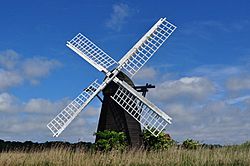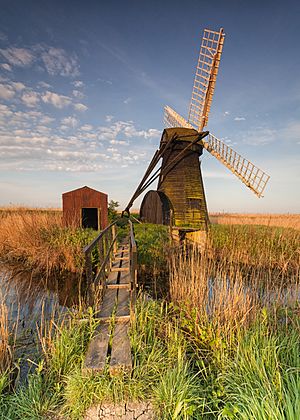Herringfleet Windmill facts for kids
Quick facts for kids Herringfleet Mill |
|
|---|---|

Herringfleet Mill
|
|
| Origin | |
| Mill name | Walker's Mill Herringfleet drainage mill |
| Grid reference | TM 4654 9762 |
| Coordinates | 52°31′15″N 1°37′58″E / 52.5207°N 1.6327°E |
| Operator(s) | Suffolk County Council |
| Year built | c1820 |
| Information | |
| Purpose | Drainage mill |
| Type | Smock mill |
| Storeys | three-storey smock |
| Base storeys | Low brick base of a few courses |
| Smock sides | Eight sides |
| No. of sails | Four sails |
| Type of sails | Common sails |
| Windshaft | Cast Iron |
| Winding | Tailpole |
| Type of pump | Scoopwheel |
| Other information | Two sails removed. |
Herringfleet Mill, also known as Walker's Mill, is a special old windmill in Herringfleet, Suffolk, England. It's a type of windmill called a smock mill. This mill is so important that it's listed as a Grade II* building, which means it's a very important historical site. Today, the mill is not in the best condition, and two of its four sails have been taken off.
Contents
History of Herringfleet Mill
This windmill was built around 1820 by a mill builder named Robert Barnes from Great Yarmouth. It was not used for a while in 1883, but it was later fixed and put back to work. The mill continued to use wind power to operate until 1956.
Saving the Mill
The owners of the mill, the Somerleyton Estate, really wanted to make sure it was saved and kept for the future. East Suffolk County Council agreed that the mill should be preserved. They asked the Ministry of Works for help, and the Ministry agreed to pay half of the money needed for repairs. Most of the rest of the money came from East Suffolk County Council and the Suffolk Preservation Society. Other groups also gave smaller amounts to help.
Restoration Work
The restoration of the mill was done by Thomas Smithdale & Sons, who were mill builders from Acle. The mill was officially opened again on July 25, 1958. Charles Howlett, who had worked at the mill for over forty years, was there to open it. More restoration work was completed in 1971 by Neville Martin, another mill builder from Beccles.
How Herringfleet Mill Works
Herringfleet Mill is an octagonal (eight-sided) smock mill with three floors. It has a special boat-shaped cap on top. The mill is turned to face the wind using a tailpole and a winch. This was the last mill in the Broads area to use this method.
Mill Machinery
The mill has four common sails that are attached to a strong cast-iron shaft called a windshaft. Inside, a wooden brake wheel with 59 teeth helps control the speed. This wheel turns a cast-iron wallower, which has 47 cogs. The wallower is connected to a square upright shaft.
At the bottom of this shaft, a cast-iron gear with 33 teeth drives a large cast-iron pit wheel with 102 cogs. This pit wheel is on a thick cast-iron shaft. At the end of this shaft is a large scoopwheel, which is about 16 feet (4.9 meters) wide. This scoopwheel was able to pump about 2,000 imperial gallons (9,092 liters) of water every minute!
Marshmen Who Worked at the Mill
Marshmen were people who operated and looked after the drainage mills.
- Jimmy Walker
- Charles Howlett (from 1916 to 1956)
Visiting the Mill
The mill is open to visitors on National Mills Day, which is the second Sunday in May. It is also open on some other days during the summer and autumn seasons.
Herringfleet Mill in Media
- Herringfleet windmill appeared in a short film called And now they rest, which was released in 1938.
- Herringfleet Mill was also featured in the opening scene of the 2014 film Mr Turner. In the movie, it was used to look like a Dutch windmill.
 | James B. Knighten |
 | Azellia White |
 | Willa Brown |


